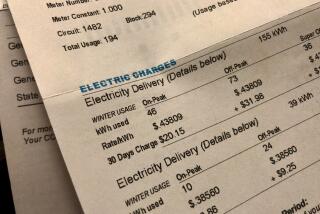Edison argues for lower fine
Southern California Edison, hoping to limit the damage from a seven-year fraud that could cost the utility $237 million, told state regulators Wednesday that the rigged customer satisfaction surveys and falsified safety data at the heart of the case did little harm and were not widespread.
For those reasons, Edison said it should pay $51.9 million in fines and refunded performance bonuses instead of the higher price tag imposed recently by a judge at the California Public Utilities Commission.
The company, a subsidiary of Rosemead-based Edison International, accused the PUC judge of being biased. Utility Chief Executive Al Fohrer angrily told regulators that the $237-million price tag “goes way beyond reason.”
Edison’s arguments were countered Wednesday by two consumer groups, the PUC’s internal consumer advocacy division and commission staff members in charge of the Edison investigation. Each urged the PUC to substantially increase the penalties against Edison, contending that the fraud was pervasive and that the judge was too lenient.
“Adopting Edison’s position would deny justice to its defrauded ratepayers and other members of the public and to this commission, whose trust Edison has abused,” said Richard Clark, director of the PUC’s consumer protection and safety division, the group that investigated the fraud.
Both sides delivered their evidence during high-stakes oral arguments in front of the five-member utilities commission. The Wednesday hearing was made necessary after Edison and several consumer groups appealed the October decision by Administrative Law Judge Robert Barnett.
Commissioners will weigh the arguments and either uphold Barnett’s decision or issue a new ruling.
The case stems from Edison’s admission in 2004 that employees had falsified data for seven years to help workers and the company win performance rewards that were paid for by the utility’s customers. Subsequent investigations by Edison and the PUC uncovered elaborate schemes that artificially boosted the company’s customer satisfaction scores along with extraordinary measures taken by safety managers to downplay employee injuries.
In Edison’s planning department, where employees help contractors and others with new or expanded electrical service, workers manipulated customer service surveys from 1987 through 2003 to make sure that employees and the company won bonuses from the commission.
Edison made the problem public a year after it received a whistle-blower’s letter describing the fraud and several months after a second anonymous letter was sent to senior managers -- this time with copies sent to state regulators and other public officials.
To help their cause amid chronic understaffing and a surging workload, Edison employees erased or changed the phone numbers of unhappy customers to prevent customer satisfaction surveyors from reaching them. At times, workers substituted the phone numbers of relatives or of customers who could be counted on to give glowing assessments of the company’s work.
Based on the survey results, Edison collected $28 million in customer-funded incentives and had laid claim to $20 million in additional bonuses.
Edison later found flaws in the employee health and safety data it used to win $20 million in rewards and to seek $15 million more in bonuses. That probe found that Edison’s records were unreliable and that some managers sought to minimize injuries by asking employees to treat themselves and by pressuring doctors to alter records or eliminate work restrictions at San Onofre Nuclear Generating Station.
A few weeks ago, the Nuclear Regulatory Commission said it had found five violations of federal regulations over the last year at the San Onofre nuclear facility operated by Edison. Federal regulators said that the incidents involved “willful violations,” but also that the lapses were not deemed serious, and the company agreed to revamp its ethics and other training in lieu of paying penalties
Barnett’s decision in the Edison case, issued after nine days of courtroom-style proceedings, imposed a record $40-million fine on the company in addition to the restitution. The judge said there was “overwhelming evidence” that senior managers at Edison knew about the multiyear fraud and that he would have fined the utility more than $100 million if not for Edison’s actions and cooperation after the wrongdoing was made public.
On Wednesday, Edison CEO Fohrer rejected Barnett’s conclusion that high-level managers condoned the cheating.
“The idea that senior management knew and turned a blind eye to this is not acceptable. It’s not the way I behave [and] it’s not the way I want people around me to behave,” Fohrer said. “Nor would I tolerate it.”
Edison has repeatedly argued that after it uncovered the fraud, it acted quickly to root it out and discipline those involved. Given those actions and the company’s subsequent cooperation with investigators, Edison attorney Charles Read called Barnett’s ruling “completely out of line with the history of this commission’s few very large penalties.”
Dana Appling, director of the PUC’s Division of Ratepayer Advocates, disagreed.
“Edison should not be allowed to benefit from its wrongdoing, and its customers should not be required to pay for any amount of Edison’s fraud,” she said. “No matter at what level of the organization this fraud occurred, the corporation must be held accountable.”
--
(BEGIN TEXT OF INFOBOX)
Jolting Edison
Robert Barnett, an administrative law judge at the California Public Utilities Commission, ruled in October that Southern California Edison must pay $237 million for manipulating data to win performance bonuses that were paid by its customers.
Customer satisfaction
Electricity service planners rigged customer satisfaction surveys to win performance bonuses. Employees falsely changed phone numbers in company records so unhappy customers couldn’t be reached by surveyors, sometimes replacing them with the numbers of relatives or others who agreed to praise Edison’s work. Punishment: $48 million, including refunding $28 million in rewards already paid to the utility and withdrawing its claims for $20 million in additional bonuses.
Employee health, safety
Edison employees underreported first aid incidents to win performance bonuses. San Onofre Nuclear Generating Station safety managers disguised injuries and falsified safety records by asserting that an injury happened at an employee’s home instead of at work, recording injury lost time as vacation or sick days or pressuring doctors to use Steri-Strips in lieu of stitches.
Punishment: $35 million, including refunding $20 million in rewards already collected by Edison and withdrawing requests to $15 million in additional bonuses.
Results-sharing bonuses
Edison’s incentive pay plan called “results sharing,” funded by ratepayers, was based in part on the tainted performance results in customer satisfaction and employee health and safety categories.
Punishment: $88 million, representing a partial refund out of the $191.7 million in cash payouts to employees over three years.
Civil penalties
Warranted: $102 million would be appropriate, given the magnitude of the fraud, which cost ratepayers $124.7 million, Barnett said.
Actual: $40 million, a commission record. Barnett said he reduced the fine because of Edison’s “excellent cooperation.”
Interest: $26 million
Source: Times research
More to Read
Inside the business of entertainment
The Wide Shot brings you news, analysis and insights on everything from streaming wars to production — and what it all means for the future.
You may occasionally receive promotional content from the Los Angeles Times.










